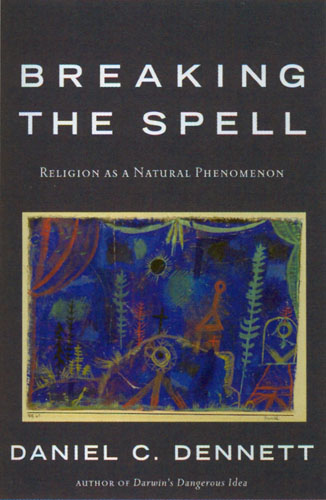BREAKING THE SPELL: RELIGION AS A NATURAL PHENOMENON
Daniel C. Dennett
New York: Viking, February 2006
448 pp.; $25.95 (cloth)

IT MAY BE ILLUMINATING to begin with a catalog of the things to which Professor Dennett compares religion: music, sex, belief in Santa Claus, sweet tooth, leks (the sites for mating rituals performed by certain mammals, fish, and insects), brand loyalty, and lancet flukes. In his new book, Breaking the Spell, Dennett develops a convincing evolutionary scenario in which religions emerge through natural selection and through market forces, without guidance, human or divine. He tickles and he probes. Could male religiosity have been genetically favored, like male peacock feathers, by the approbation of fertile females? Is human belief in God an outgrowth of HADD (hyperactive agent detection device), a defensive neural mechanism demonstrable even in clams?
And take all those incomprehensible articles of faith. Are they not good for maintaining market share? Is it possible that their incomprehensibility is, in fact, their chief selling point? The deity that cannot be named or depicted cannot so easily be dethroned. Dennett points out that “the postulation of invisible, undetectable effects . . . systematically immune to confirmation or disconfirmation” is a quality of all religions.
Similarly, is it possible that beneath the benign and pacific face of religiosity there is actually a logical, market-driven tendency “to exploit and exacerbate social conflict whenever possible, since it is a way of generating business?”
Dennett’s refrain, hearteningly sane in this Kali Yuga of screaming zealotry, is “We don’t know.” Sublime nescience opens and anchors this important inquiry into the nature of religion and into its morality—or lack of it! Indeed, the main point of this book—“the most shocking implication of my inquiry,” Dennett writes—is that, maybe, it isn’t immoral to inquire.
Yes, it has come to this.
But to whom is Dennett talking? For humanists, Dennett is the Fisher King: simply to ask the question ends the drought. What a relief it is to witness a real intelligence at work in the midst of the current murderous miasma of fanaticism and closed-minded bibliothumpery East and West! With singular energy, expertise, and penetration, Dennett marshals evidence from sociology and evolutionary biology to question the nature and utility of religion. But when he trumpets his philosopher’s credentials, I am reminded of those early Mahayanists who classified philosophers among the “icchantika,” i.e., those lacking a Buddha-nature: The professor can be pedantic, condescending, prolix, and distractingly irrelevant. Here and there he commits self-indulgent digressions, the product, perhaps, of days in the lecture hall before fawning undergrads. From the outset, Dennett declares his intention to reach a wide audience. Some of his passages feel dumbed down, and yet, Breaking the Spell is also chockablock with closely reasoned treatments of the latest scientific data. Can he have it both ways?
Dennett cites as “brave” Sam Harris’s book The End of Faith, a pugnacious argument for nonsectarian clarity of thought versus the ravening hordes of the Faithful. (See my review of this book in the Summer 2005 issue of Tricycle.) Like Harris, Dennett puts forward a desperate program of ending bloody-minded zealotry by appealing to the moderates in each camp—Christians, Muslims, and Jews—to rein in their fanatics. Yet he repeatedly confesses, in various ways, that such a course has, in the past, been “singularly ineffective.” He has put himself in the impossible position of shouting out of the pages at an audience that he knows will not hear him: Through the book runs this slightly silly obbligato: “You . . . you . . . you are being unreasonable in taking your stand. . . . you . . . you . . . you . . .” Early on, he says to the imagined fundamentalist foe: “If you insist [on your Bible as inerrant foundation of all discussion], then you are thumbing your nose at the whole conversation,” and then parenthesizes: “(Good-bye, and I hope to see you back again someday).”
What day could that be? Has Dennett been too long in the academy? He tells us that in interviews and conversations preparatory to this writing, he went “directly to real people.” Alas, this is the sort of a phrase that, if not from demagogues, can only come from the effete. This book sometimes has the “I dare you to print this letter” tone of a gelded activist, and yet, clearly, the author is an engaged intellectual who seeks to inform the largest possible audience. Here is our terrible dilemma, a sign of the times: when fanaticism is mainstream, reason becomes fanatical.
Dennett’s book is really wonderful in so many important ways that it may seem disproportionate to dwell on this question of his audience, but it is a crucial one. The more ingenious his arguments, the more potent his case, the more tragic is his situation—and ours. For so much less likely is the bloody-minded opposition to hear it.